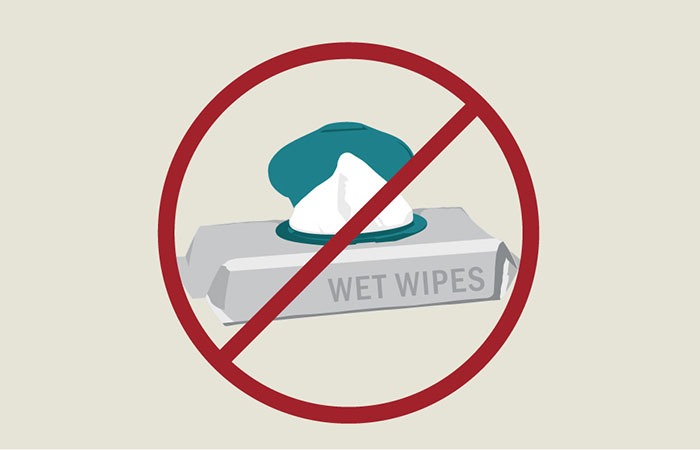
Baby wipes are commonly used by parents to clean their babies, but they are not recommended for regular use. This is because baby wipes contain chemicals, fragrances, and preservatives that can irritate a baby's delicate skin and cause rashes, allergies, or infections. Instead, it is recommended to use warm water and mild soap or a gentle, unscented baby wash for cleaning. If you must use wipes, look for ones that are labeled as "natural" or "unscented" and made with safe, gentle ingredients. It is always best to talk to your pediatrician before using any new product on your baby.
Baby wipes are commonly used by many parents for cleaning their babies, but there are several reasons why they should be avoided:
Allergic reactions: Some babies may have an allergic reaction to the chemicals in baby wipes, leading to itching, redness, and swelling.
Fragrance-free options: Not all baby wipes contain harsh chemicals, and some companies offer fragrance-free options that are gentler on a baby's skin. It's important to read the labels and choose a product that's appropriate for your baby's delicate skin.
Alternative options: Instead of using baby wipes, you can consider using soft cloths or cotton pads moistened with warm water to clean your baby. These natural options are gentler on the skin and won't cause any adverse reactions.
Consult with a pediatrician: If you have concerns about the chemicals in baby wipes, consult with a pediatrician to find out which products are best for your baby's skin. They can also provide recommendations for alternative options if necessary.
This can cause harm to the environment and wildlife. The packaging and discarded wipes can also clog drainage systems and contribute to litter in landfills and on beaches. To reduce their environmental impact, it's recommended to use reusable cloth wipes that can be washed and reused, or switch to a gentler alternative such as a warm water and cloth solution.
Lack of regulation: Unlike other baby products, baby wipes are not regulated by the FDA and their ingredients are not required to be disclosed. This lack of regulation can lead to unknown and potentially harmful ingredients being included in the wipes.
Reduces Natural Lubrication: Using baby wipes too frequently can remove the natural oils from a baby's skin, causing it to become dry, irritated and even chapped.
Alternatives: Instead of baby wipes, you can consider using soft cloths with warm water or fragrance-free, all-natural wipes made with ingredients like aloe vera and chamomile
Additionally, excessive use of baby wipes can disrupt the natural balance of oils and bacteria on the skin, which can lead to skin irritation and increase the risk of infection. Some baby wipes also contain surfactants, which can strip the skin of its natural oils, making it dry and sensitive. It's best to limit the use of baby wipes and consider using a soft, damp cloth instead.
Can be expensive: Compared to using plain water and a soft cloth, using baby wipes regularly can add up and become expensive in the long run. Additionally, there are eco-friendly alternatives that are often cheaper and better for the environment.
Not as effective as cloth and water: While baby wipes may seem convenient, they are not as effective in cleaning as using a soft cloth and plain water. Wipes can leave behind residue and not completely clean the skin, leading to an increased risk of diaper rash and other skin irritations.
Overall, it is always better to opt for more natural and gentle alternatives for cleaning your baby, such as soft cloths and plain water, rather than relying solely on baby wipes. Consult with your pediatrician if you have any concerns about the best way to clean and care for your baby's delicate skin.
Baby wipes can be a source of bacterial contamination, leading to infections if not stored properly or if they are used repeatedly on the same area. This can be especially dangerous for newborns with underdeveloped immune systems.
Baby wipes can contain harmful bacteria if they are not stored properly, which can lead to infections in your baby. The moist environment in the wipes can create a breeding ground for bacteria, which can then spread to your baby's skin. This can lead to skin irritation and other infections, especially in areas such as the diaper area. It's important to always use fresh wipes and store them properly to avoid this risk.
Using plain water for cleansing your baby's skin is often a gentler and more natural option. Baby's skin is delicate, and it's essential to choose products that are free from harsh chemicals and fragrances that can cause irritation. A warm cloth or soft sponge with water can effectively clean the skin without stripping away its natural oils. Additionally, using plain water also helps to avoid contributing to environmental pollution.
Alternative options:Consider using cloth diapers and washable wipes, which are more environmentally friendly and cost-effective in the long run. You can also use a warm washcloth and water to clean your baby's skin. These alternatives are gentler on a baby's skin and do not contain harsh chemicals or contribute to environmental pollution.
In conclusion, it is better to avoid using baby wipes, and instead opt for water and a soft cloth for cleaning a baby's skin. Consult with your pediatrician if you have any concerns or questions about the best way to care for your baby's delicate skin.
Established in 2013, FamilyNeeds.net is connected to your lifestyle and everyday life. Publish reviews of your life, style, fashion and essentials.